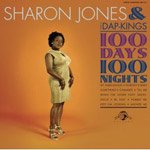I remember whining in the mid-'90s over the lack of “true” R&B music. There were, of course, schmaltzy acts like Boyz II Men, Toni Braxton, and All-4-One who I assumed typified the genre (I was 13), but I recognized even then the absence of your Otis Reddings, your Etta James, and your James Browns. Now I'm a bit older and find myself listening to Sharon Jones and The Dap-Kings, who are poised to fill that specific void in mainstream R&B music. And the word “mainstream” is key here, because I doubt soulful, raunchy, funk-filled rhythm and blues ever really went away -- it just wasn't noticed. Not by radio listeners, not by the MTV audience, and as far as I'm concerned, not by the indie zine crowd either.
So, why Sharon Jones and why now? Among other things, the woman can sing. Her voice is devoid of the modern diva's histrionics, restrained when it needs to be, powerful when the music churns up; it's a joy to hear, really. She's also got over 40 years of experience, a weathered history that constantly seeps through in her music. (A long story short, she was born in the southern '50s, moved to New York to work as a backup and session musician, and through a few twists and turns -- and a significant break from music -- released two albums and a lot of 45s on her flagship label, Daptone Records.) 100 Days, 100 Nights is her third release under the 'Sharon Jones and The Dap-Kings' moniker, and it's her slickest, most soulful effort, one that comes at an opportune time in American culture.
For proof of the public's willingness to accept Jones' brand of R&B, you needn't look further than her band, The Dap-Kings, who are fresh off performing and recording with Amy Winehouse. Actually, they're fresh off making Amy Winehouse famous in the states, and 100 Days is a good example why. The Dap-Kings pack an immediate punch, one that's simultaneously sharp and bulbous, one that cuts straight to the point. The first time I heard the rhythm section, I was struck by the vintage sound, its resemblance to an old, sampled J.B.s break but with added fidelity. It catches you off guard, leaving you to think “wait, is this new?” -- a question that 100 Days never really confirms or dispels. And in some ways, that presents a dilemma.
100 Days, 100 Nights's vintage feel will be a major point of contention for those who care enough to consider it. Can we look at an obvious genre exercise like this as being truly “new”? Does it matter? The songs on the album reliably fill the Motown/Stax template, never really rising above the tried-and-true archetype and never delivering a truly infectious chorus. In fact, there doesn't seem to be a saccharine/pop inflected bone in The Dap-Kings' body; it's all classic soul here, and we've heard it done similarly before. While the crispness of the production elevates the album into modern territory, many will find it difficult to remove Sharon Jones and The Dap-Kings from a 'retro' context.
On an intellectual level, 100 Days is a straightforward progression of rhythm and blues, but on the gut level, well, words like “modern” or “derivative” become fairly worthless. That the music hits you, and that you only start to contemplate its cultural baggage after getting over the initial punch makes Sharon Jones a contemporary to your Otis Reddings, your Etta James, and your James Browns, not a mere imitator. 100 Days, 100 Nights further proves that not every familiar sound has to be a rip off, that in a historical context, music hasn't hit a brick wall. Not everything is post-genre. Assuredly, Sharon Jones is the genuine article.
More about: Sharon Jones and The Dap-Kings


